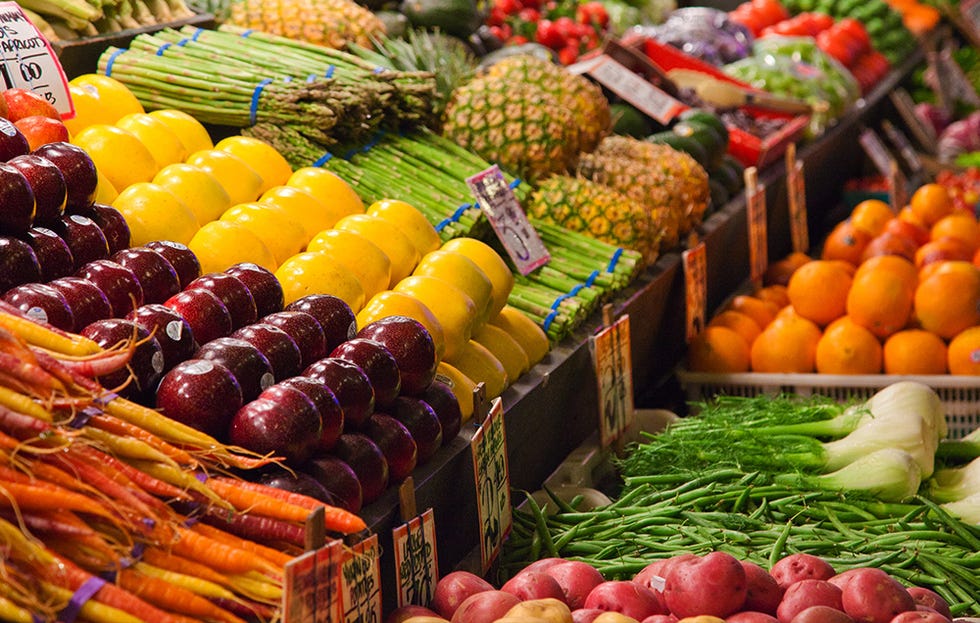Asking which fruit is healthiest is sort of like asking which kind of exercise is best for your muscles: they’re all good for you.
But, we get it, a person can only eat so much fruit in a day, so you might be looking to prioritise your fruit intake based on how healthy certain fruits are for you.
‘Depending on what characteristics a person is looking for in a fruit – whether it is a higher fibre content, more vitamins like vitamin C, or more minerals like potassium – one fruit might be nutritionally superior to another,’ says Lisa McAnulty, Ph.D., a professor of nutrition at Appalachian State University.
But even this idea of nutritional ‘superiority’ is kind of silly. All fruit is good for you. All fruit is rich in vitamins, minerals and other nutrients. All fruit is loaded with disease-fighting antioxidants and a good source of stomach-filling fibre. All fruit is superior.
If anyone has ever told you not to eat fruit for any reason (fruit is high in sugar, fruit is high in calories, blah blah blah), know that they are flat-out, totally and completely wrong.
No legitimate registered dietitian we have ever talked to at Men’s Health has ever, under any circumstance, recommended that you stop eating fruit. This has not stopped so-called ‘experts’ from telling their Instagram followers that fruit will make you gain weight, drive up your risk of diabetes or default on your mortgage.
The bigger truth is this: you’re probably not eating enough fruit. In fact, according to the latest National Nutrition Survey, which includes data from 2019-2023, less than one in five adults (17%) met the 5-a-day recommendation.
Which means that any fruit you may eat – apple, orange, banana, blueberries, pears, mango, dragonfruit, whatever – you should probably just eat more of them.
What Are the Healthiest Fruits to Eat?
After crunching some numbers using the USDA Nutrient Database, we determined that these are the healthiest fresh fruit sources for different vitamins and nutrients. They appear as different quantities because we’ve converted the one-cup measurements to the UK-standard gram. So, while they technically weigh different amounts, the numbers are still based on one cup of each fruit.
getty
Fibre: Raspberries, 8g per 123gProtein: Passionfruit, 5g per 236gCalcium: Dates, 96mg per 188gIron: Persimmons, 3.75mg per 170gMagnesium: Dates, 81mg per 188gPotassium: Guava, 688mg per 165gZinc: Blackberries, 0.76mg per 144gVitamin C: Guava, 377mg per 165gFolate: Guava, 81mg per 165gCholine: Clementines, 21mg per 225g
Again, these are nutrient-specific rankings and ultimately kind of useless because you’re not really eating fruit for certain nutrients, but there you go.
The bottom line: eat fruit, and a wide variety of it, to reap all the many benefits.
Is the Sugar in Fruit Bad For You?
Despite what you might have heard, there isn’t a big difference among whole fruits when it comes to their effect on your blood sugar levels.
It’s worth nothing that the kind of sugar you find in fruit is not the same kind of added sugar that you’ll find in processed foods.
Fruits that are high in natural sugar also tend to contain both soluble and insoluble fibre, which slows the absorption of these fruit sugars, preventing big blood-sugar spikes, says Robert Lustig, M.D., professor emeritus of paediatrics at the University of California, San Francisco and author of Fat Chance: Beating the Odds Against Sugar, Processed Food, Obesity, and Disease. ‘So even if you’re taking in a lot of sugar with some fruits, you’re not absorbing that sugar,’ he adds.
Blending fruit (like in a smoothie blender) breaks down its insoluble fibre, allowing your body to absorb a lot more fruit sugar in a short period of time. ‘The blades of the smoothie machine shear long strands of insoluble fibre to smithereens,’ Lustig says.
While you’ll still get all the fruit’s vitamins and nutrients, you need to be careful about overdoing it with smoothies, he says.
What Are the Healthiest Fruits For Weight Loss?
Some diets, like Keto, box out fruit intake because fruits are carbohydrates and you can only eat very, very little carbohydrates if you want to stay in the fat-burning state called ketosis.
And while you may lost weight on carb-restricted diets like keto, you also have to consider what you’re sacrificing: the disease-fighting powers of antioxidant-rich fruits, which, yes, are higher in carbs, but so what?
Fruits tend to be relatively low in calories, making them a great snack, side dish to a meal, or a dessert to end a meal (chilled orange segments, anyone?). A cup of blueberries contains just 84 calories. One kiwi has 48 measly calories. Even a ‘carb-dense’ banana only has 122 calories.
Solid weight-loss plans can – and should – make room for a variety of fruits.
Which Single Fruit is the Best to Add to Your Diet?
All of them.
But assuming you’re sticking to whole fruits, and you’re wondering which kind is the absolute best to add to your diet, there is one type that should top your shopping list: berries.
SimpleImages//Getty Images
In the fruit Olympics, berries would likely come out on top
‘Berries of all kinds – including blueberries, strawberries, blackberries, goji berries, cranberries, blackcurrants, and bilberries – are an excellent type of fruit to consume because they are low in fat and calories and are a good source of fibre and several key vitamins and minerals,’ McAnulty says.
Berries are also packed with a variety of healthy plant chemicals called polyphenols, she says. These include anthocyanins and anthocyanidins, which research has linked to improved heart and brain health, reduced cancer risks, improved insulin sensitivity, and better blood pressure scores. More evidence has tied the antioxidant bioactive compounds in berries to lower levels of inflammation and other health benefits.
Raspberries in particular may be king of the hill when it comes to good-for-you fruits. Along with all the healthy berry attributes mentioned above, raspberries contain more fibre than sugar, per USDA estimates. That’s a very good thing. Research has consistently linked dietary fibre to lower rates of disease and death, but most of us aren’t getting nearly enough of it. The NHS recommends around 30g a day, which only 4% of adults met in the most recent National Diet and Nutrition Survey. That makes raspberries an especially healthy addition to your diet.
To get your fill of these and other berries, McAnulty says fresh-picked are best because fruit tends to lose some of its healthy nutrients the longer it sits around in shipping containers or store shelves. ‘Another good option would be to consume frozen berries because, generally, the berries have been harvested and then immediately frozen, maximising retention of their nutrients,’ she adds.
What Are the Best Fruits to Eat Daily?
Again, all of them. Are you seeing a trend here?
‘Since different fruits possess different phytochemicals with the ability to exert a wide variety of beneficial health effects, it would be unwise to consume only one type of fruit,’ McAnulty says, with the more fruit diversity the better.
‘It would be unwise to consume only one type of fruit’
And that includes, but is not limited to:
ApplesGrapesMelonsDatesJackfruitJujubesGooseberriesElderberriesFigsBananasMangosWatermelonOrangesPomegranatesGuavaPawpawsDurianRaspberriesPersimmonsStarfruitPapayasPlumPearsCherriesApricotsCranberriesLycheeKiwisDragonfruitPeachesGrapefruitStrawberriesAnd many, many moreRelated Stories
Markham Heid is an experienced health reporter and writer, has contributed to outlets like TIME, Men’s Health, and Everyday Health, and has received reporting awards from the Society of Professional Journalists and the Maryland, Delaware, and D.C. Press Association.

Paul Kita is a Deputy Editor at Men’s Health, where he has covered food, cooking, nutrition, supplements, grooming, tech, travel, and fatherhood at the brand for more than 15 years. He is also the author of two Men’s Health cookbooks, Guy Gourmet and A Man, A Pan, A Plan, and the winner of a James Beard Award.


